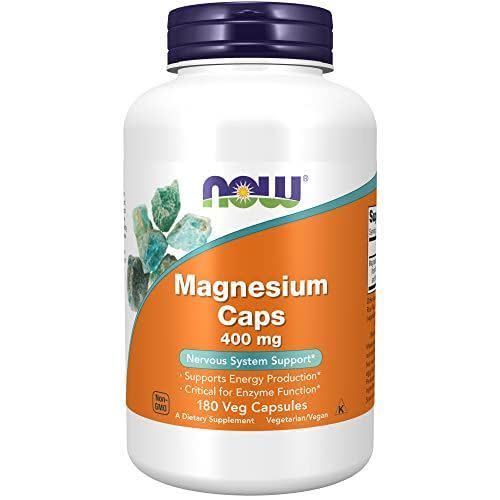What Is the Best Magnesium to Take? Experts Weigh In

"Hearst Magazines and Yahoo may earn commission or revenue on some items through these links."
Magnesium sounds a little bit like a character in an X-Men movie — and in a way, the essential mineral found in many foods is a nutritional superhero. “Magnesium is involved in more than 300 chemical reactions in the body,” explains nutritionist Marissa Meshulam, R.D., of MPM Nutrition in New York. “It serves as a cofactor, helping enzymes carry out various reactions in the body.” Some of magnesium’s important functions include blood sugar regulation, maintaining nerve and muscle function, keeping bones strong, boosting immunity and even helping keep your heartbeat steady.
It may even help you get a good night's sleep. “Interestingly, magnesium is also a key nutrient in the DASH diet and can help lower blood pressure,” adds Lauren Twigge, R.D.N., of Lauren Twigge Nutrition. “Magnesium is a major mineral, meaning it is needed in larger amounts than other minerals, so it is important that we get sufficient amounts of magnesium in through our diet to help our body function properly.”
Some more intriguing magnesium news: A 2023 study from Australia found that dietary intake of magnesium was related to better brain health, especially in women. And a recent review of research has shown that magnesium supplementation in patients may lower both systolic and diastolic blood pressure in people with type 2 diabetes “Given how many processes magnesium regulates in our bodies, deficiency can create a whole host of issues,” Meshulam adds.
The average daily recommended amount of magnesium is 310-320 mg for adult women (teen girls and pregnant women need a little more, roughly 360), and 400-420 mg for adult men. The best way to get that is through food.
Now, even if you don’t get enough magnesium from what's on your plate, it’s unlikely you’ll have a true shortage (symptoms of that would include muscle weakness, irritability, sleepiness and depression). But certain conditions, such as being treated with diuretics, eating a very poor diet, GI diseases such as Crohn’s or celiac, alcoholism, severe vomiting or diarrhea or complications with type 2 diabetes can increase your risk for a magnesium deficiency.
“When you are deficient in magnesium, certain body functions tend to slow down or stop working altogether and can result in general symptoms like loss of appetite, fatigue, and nausea,” says Twigge. "If allowed to worsen, more significant symptoms like body numbness, abnormal muscle contractions, irregular heart rhythms and even seizures can occur.”
Magnesium Glycinate 200 mg

Magnesium Glycinate 200 mg
amazon.com
$13.79
Magnesium 400 mg

Magnesium 400 mg
amazon.com
$13.46
Neuro-Mag Magnesium

Neuro-Mag Magnesium
amazon.com
$29.24
If you're looking for a magnesium supplement, it can get a little confusing: There are several different types of magnesium available that all sound vaguely similar but have slightly different functions. “Understanding which magnesium you are taking is key to getting the desired results,” points out Mehulam. Below, we break it down for you.
Types of magnesium
Magnesium oxide
This is one of the more common magnesium supplements, and there is some evidence that 400–600 mg of magnesium oxide may help prevent migraines, especially in those who experience aura, or who have migraines related to their menstrual period. But be sure to discuss with your doctor before taking it. The side effect is similar to the effect from the hydroxide form: diarrhea. “Magnesium oxide is poorly absorbed and is not a great choice to use for correcting magnesium deficiency. This form is useful in GI relief, like heartburn or constipation,” says Meshulam.
Magnesium hydroxide
If you’ve ever swigged down some Milk of Magnesia to get your insides moving when you’ve felt a little backed up, this saline laxative is what you were drinking (it's also used commercially as a flame retardant, who knew?). Whether in pill or liquid form, it works as a laxative by attracting and retaining water in the intestines and increasing the movement of the intestines that gives you the urge to go to the bathroom. It can also be used to relieve heartburn, acid indigestion and upset stomach.
Magnesium citrate
The name gives you a hint that this form of magnesium is found in citrus fruits. It is also found in many supplements and is easily absorbed. Magnesium citrate is also widely used for constipation, says Twigge, since it increases the amount of water your intestine absorbs, which makes the stool softer and easier to pass. “Magnesium citrate is another great bioavailable form of magnesium, meaning we absorb it pretty well in our guts,” adds Meshulam. She also says that it has a gentler laxative effect than magnesium oxide.
Magnesium chloride
This form of magnesium that contains chlorine, and it is commonly used to supplement a lack of magnesium in the diet. Usually taken in pill form, it also easily absorbed. Some research has suggested this might be useful for treating symptoms of depression, but more work needs to be done.
Magnesium lactate
Magnesium lactate is also commonly easily absorbed and used as a supplement for people who have a magnesium deficiency, and it is often given in slow-release form. It is also used as a preservative and flavoring for food—when food says it is "fortified," this is usually the type of magnesium in contains. As with most magnesium supplements, too much can cause diarrhea, bloating or gas.
Magnesium glycinate
"Magnesium glycinate is well absorbed and is regularly used for the relaxation effects of magnesium without having any laxative effects," says Meshulam. There is some research showing that this form of magnesium may be useful in treating depression, and it is also sometimes recommended for helping people with insomnia.
Magnesium sulfate
Also known as Epsom salts, magnesium sulfate has been used as a treatment for constipation for hundreds of years. In addition to its laxative effects, it is often used in a powder or crystal form to create a soaking solution for achy muscles and sore feet.
Magnesium malate
This form includes malic acid, which has a sour taste and occurs naturally in foods such as fruit. This is well-absorbed, and has less of a laxative effect, making it a good option for a supplement.
Magnesium l-threonate
“This is a well absorbed magnesium that is most notable for boosting the concentration of magnesium within our brains," says Meshulam, who adds that it often promoted to help with memory retention and depression. Though there are many products claiming this can help stave off dementia, most of the research has been done on animals, so it’s not clear yet what the benefit is for humans.
FAQ
Should I take a magnesium supplement?
Not necessarily. If you're eating a well-balanced diet with plenty of fruits, vegetables, whole grains, and dairy (see the list of magnesium-rich food, below) and don't have any chronic illnesses that could affect your absorption of minerals, it's very unlikely that you have a magnesium deficit. But if you are interested in trying it to help you sleep better or to improve your blood pressure, discuss the benefits and risks with your health-care provider, who can also advise you on what type and how much to take.
What's the best way to get magnesium from food?
"As with most nutrients, the best way to get enough magnesium is to be sure you are eating a wide variety of foods," says Twigge. Magnesium-rich food includes:
Whole grains, such as brown rice
Dark, leafy greens such as spinach
Nuts, such as almonds and cashews
Seeds, such as pumpkin or chia
Beans, such as black beans
Legumes such as peas and soybeans
Fruits, such as avocado and banana
Fortified breakfast cereals and oatmeal
Milk (cow or soy)
Can I get too much magnesium?
It’s unlikely that you’ll get too much from food — the kidney simply removes any extra. But you can take too much in supplement form. You should be careful not to exceed the daily upper limit of 350 mg for women, which could lead to diarrhea, cramping, and nausea.
What should I look for in a supplement?
Meshulam recommends talking to your health care provider and getting your blood work done first to see if you truly have a deficiency before supplementing. Twigge also points out that magnesium can interact with certain medications, so, double check with your doctor that it's safe for you to supplement. Also, always make sure your supplement has been third-party tested (look on the package or the company’s website for details).
You Might Also Like

